#guy who experiences 2 minutes of loneliness and thinks he's sick and dying
Text
28 Books, 1 Year
Well, 2020, amirite? Staying home with a 4-year-old and a baby really decreased my reading time, bringing me to my lowest total ever since starting this blog. Here we go!
1. Her Body and Other Parties / Carmen Maria Machado
I rarely feel stupid when reading fiction, but this collection of short stories left me feeling pretty stupid. Machado's writing is visceral and gorgeous but what she's trying to say is mostly beyond me. Overall, the collection (as evident by the title) looks at the ways existing in a woman's body is fraught. Sometimes we want to escape our bodies, often our bodies are harmed or taken advantage of against our will, sometimes our bodies fail us. But as for the more nitty-gritty takeaways, I couldn't get there. One story in particular is staying with me. In it, Machado invents new summaries of each and every episode of Law & Order: SVU, telling a tale of a living, breathing New York City that requires regular blood sacrifices and in which everyone has a doppelgänger. I liked it, but definitely didn't get it.
2. Moon of the Crusted Snow / Waubgeshig Rice
This wonderfully chilling read takes place on a remote reserve in Northern Ontario. Over the course of a few days, cell service stops, the internet goes down, and the power goes out. With no communication possible with other communities, the reserve's residents can only guess at what may be occurring down south. As autumn creeps toward winter, the snow piles up and panic sets in. Eventually, a visitor arrives via snowmobile and confirms the residents' worst fears about the state of civilization while also asking to stay on in the community. Can he be trusted? Will others follow? This was a tense page-turner looking at the importance of community, preparedness and leadership.
3. Tiny Beautiful Things: Advice on Love and Life from Dear Sugar / Cheryl Strayed
Dear Sugar's advice to a person who didn't know whether or not he wanted kids is what turned me onto her. The answer was perfect. For someone on the fence, there is no right answer, no wrong answer. But there was a simple beauty to the way she said this. In this advice column collection, Sugar answers questions about love, parenthood, friendship, loss, death, finances, education, hopes and dreams. She insists again and again that we open our hearts and give forgiveness a chance while still maintaining healthy boundaries. And through her answers (and anecdotes) she showers love and care on so many devastated readers who are often writing to her as a last resort.
4. Girlfriend in a Coma / Douglas Coupland
We start the action with a Breakfast Club-type group of teens at a party in 1979 Vancouver. One of them, Karen, ends the night in a coma and doesn’t wake up for 16 YEARS. Also, turns out she was pregnant, and gives birth while in the coma. Richard, her boyfriend, raises their daughter with the help of his parents and friends, and by the time Karen wakes up again, the world has gone downhill. Not long after she wakes up, everyone starts falling asleep and dying except for the original group of friends and Karen’s daughter. I liked this novel as I’m a sucker for everything dystopian, but I also had to ask WHY? Why this random group of teens out of all the world? Why did Karen have to be in a coma for so long? How does it tie into the apocalypse? I still don’t know guys. I still don’t know.
5. How to Change Your Mind: What the New Science of Psychedelics Teaches Us About Consciousness, Dying, Addiction, Depression, and Transcendence / Michael Pollan
Back in the 1960s, research on LSD was banned thanks to a moral panic. But today, scientists and therapists are starting to study its uses again. Pollan takes a deep dive into the future of LSD, psilocybin (certain mushrooms, and if I remember correctly, a substance that a certain toad secretes?!) and DMT, taking various trips himself with the help of trained guides. His vivid descriptions of each trip were the highlight of the book, and I find myself, someone who has never tried anything other than pot, wanting to try microdosing in the future.
6. Eleanor Oliphant is Completely Fine / Gail Honeyman
The first of two contrarian reviews this year, I really didn’t like this book. I found Eleanor’s character and quirks completely unbelievable, and even discovered a little hole in the plot demonstrating that she can’t be as out of touch with pop culture as Honeyman claims she is (which I can’t reveal to you because it’s also a spoiler). I think my issue is that as far as I know, the author is not neurodivergent, whereas Eleanor is. I think this does a real disservice to readers, and would much prefer to read something like this by a neurodivergent author.
7. The Story of the Lost Child / Elena Ferrante
I finally finished the Neapolitan Quartet series! The fourth and final book finds Elena and Lila in their thirties and follows them until they’re in their sixties as they navigate professional successes and failures, new aspects of motherhood, relationship woes, and a fraying friendship. The dynamics of the friendship at the core of this series speak to me so deeply and captures so much about the passion, tension, tenderness, and competition that lurk within a longtime platonic relationship.
8. The Seven Deaths of Evelyn Hardcastle / Stuart Turton
Dare I describe this as Downton Abbey meets Black Mirror? Aidan Bishop wakes up on the same date and in the same setting every day (Blackheath Manor on Evelyn Hardcastle’s birthday) but as a different guest or employee each time. Each night, Evelyn Hardcastle is murdered. Aidan quickly learns that his task is to find the murderer, using the different skillsets and vantage points he inherits with each subsequent body. The tension! The twists! The gorgeous setting! I loved this winding, wild novel.
9. You Were Born for This: Astrology for Radical Self-Acceptance / Chani Nicholas
If you are an astrology lover and don’t know who Chani Nicholas is, you’ve been living under a rock! Follow this woman! Her practice and guidance is so inclusive - feminist, anti-racist, anti-transphobic, body positive, and all about how to discover and lean into your gifts and talents while keeping in mind the greater good and working toward a more progressive society.
10. An Ocean of Minutes / Thea Lim
I started reading this dystopian novel about a pandemic right at the start of the pandemic! Maybe not a wise decision, but it didn’t matter, because this book is a beautiful, moving read. In the near future, young couple Polly and Frank find themselves stranded in Galveston, Texas, when a deadly virus begins sweeping across the globe. Frank gets sick, and the only way that Polly can pay for his expensive life-saving treatment is if she signs up as a bonded laborer and travels to the future (yes, time-travel exists!) The couple agree to meet up in 12 years (which will really be just a few short days for Polly). However, Polly is send an extra five years into the future, and Frank is nowhere to be found. The worry I felt! Polly’s loneliness and confusion in the future! Will they find each other again? Oh boy, this was an emotional ride!
11. Where the Crawdads Sing / Delia Owens
The second of my two contrarian reviews this year, I also really disliked this book, which everyone else and their mother seemed to adore? It was bad! The plot felt really contrived, the characters were two-dimensional, and I felt icky about the author’s two Black characters and how the protagonist, Kya, interacted with them. I don’t think Delia is informed enough about the realities of the Black experience, then and now, to responsibly write Black characters. Also, the ‘twist ending’ was a snooze fest. The one redeeming factor was the author’s palpable love of and knowledge about nature. I really did enjoy reading about the coastal habitat and sea life that the Kya loved so much. Oh, what’s this novel about, you ask? It’s a combo coming-of-age / murder mystery set in the 1950s and 60s.
12. The Skin We’re In: A Year of Black Resistance and Power / Desmond Cole
Cole is a Canadian journalist and activist shining a much needed light on racism in this country. In this book, he highlights one incidence of systemic racism in action per month during the year of 2017, focussing on police brutality, harm caused by school boards and educators, the Canada 150 celebrations, and unjust immigration policies. This book packs a punch and Cole’s writing style is really accessible. It’s a great entry point into learning about the realities of racism in Canada.
13. Emergent Strategy: Shaping Change, Changing Worlds / Adrienne Maree Brown
I absolutely loved this book, though I find it hard to pin down. At its core, it encourages us to think more deeply and holistically about nature, social justice, and community. Brown is heavily influenced by Black sci-fi / dystopian master Octavia Butler, specifically Butler’s ideas around “shaping change” while living through change. It’s full of gems of wisdom, like this quote, which is one of my favourites: “Imagination is one of the spoils of colonization, which in many ways is claiming who gets to imagine the future for a given geography.” As Brown also writes about, and which we can really see in this moment, we are currently living through the tail-end of a dying society, imagined by a small few. What could we create together if everyone’s imaginings carried equal weight?
14. From the Ashes: My Story of Being Métis, Homeless, and Finding My Way / Jesse Thistle
Thistle’s emotional and turbulent memoir begins with a loving memory of his time as a little boy at his maternal grandparents’ home. Not long after, his parents moved the family away from their Métis community and Jesse and his two brothers soon end up in the foster care system. This experience, though relatively brief, absolutely traumatized all three of them. Later, they end up living with their paternal grandparents, who love them deeply but are extremely strict, which doesn’t work for Thistle. He hits various rock bottoms, battling with addiction, trauma and homelessness at the intersection of racism. And somehow, he manages to break free of these harmful cycles, go back to school, and become an academic and best-selling author.
15. Policing Black Lives: State Violence in Canada from Slavery to the Present / Robyn Maynard
I would call this a must-read for Canadians. Maynard breaks down exactly how Canada surveils and punishes Blackness despite its claims of inclusivity and tolerance. She explores policing, yes, but also social work, education, immigration, and education and it’s impossible not to see the levers of systemic racism at work everywhere. Fair warning though, this is a more academic text and requires real concentration.
16. Jhumpa Lahiri / Unaccustomed Earth
This collection of short stories (the last being more of a novella) was gripping. I somehow fell in love with almost all of the characters. Lahiri writes people so skillfully. I felt their longing, hope, sorrow, grief, excitement. Most of the tales take place within the Indian community in Cambridge, Massachusetts, but some stories take us further afield. Lahiri picks a key relationship to focus on within each story - daughter/father, sister/brother, two roommates, childhood acquaintances - and lays them out gently under her microscope for us to see in all their intricate complexity.
17. Midnight Sun / Stephenie Meyer
Did you guys know I’m a Twihard? Having read all the Twilight novels (multiple times) way before I started this blog, this may be new information. But I’m a huge, pathetic fan and though I love Jacob, I will always be Team Edward. So OF COURSE I had to read this extremely long-awaited book, which is actually Twilight, but from Edward’s point of view rather than Bella’s. It was genuinely enjoyable, but not filled with nearly enough sexual tension for my liking. And of course, never ever read it unless you are also a Twilight fan.
18. The Sun and Her Flowers / Rupi Kaur
It’s Rupi being Rupi! I legitimately enjoy Rupi’s poetry, but I don’t love it. Some of the pieces really resonate, and others do nothing for me. But I do think she’s an important voice for young women, and specifically young women of colour. So much of her writing is about reclaiming your power, honouring the older generation of women who sacrificed so much and received nothing in return, and learning to love yourself in a society that is constantly trying to hurt you. Her poetry is always an uplifting read.
19. Conscious Creativity: Look, Connect, Create / Philippa Stanton
I’ve been following Philippa on Instagram for years as I adore her flat-lays and domestic foraging arrangements (if you follow me on IG, you may have seen my colour-themed #DomesticForaging homages to her work!) So when she published a book outlining her own creative process (and containing tons of her gorgeous photography), I had to read it. Stanton has included lots of activities meant to light your creative spark and inspire new ways of looking at things. She also writes about her experiences as a synesthete (someone who may “see” music as colours or who may “hear” shapes), which was fascinating. This is a book I’ll certainly go back to when I’m feeling uninspired. Want to follow her on IG? Her handle is @5tfinf.
20. Turkey Trot Murder / Leslie Meier
Guys, this review is the start of something BIG. Brad knows that I love to read books that are “in season” (I don’t want to read a book set in the summer during the winter, etc.). So he bought me this very niche Thanksgiving mystery novel to read in October. It’s alllll fluff, and very much in the “so bad it’s good” category. It also turns out that Leslie Meier may be one of the most prolific authors of all time, and so Brad signed me up to her “book of the month” fan club for my birthday this year, meaning I get a new, seasonally appropriate Meier classic each month. (You should also know that the “book of the month” fan club is entirely made up, and the letters from Leslie are actually written by Brad, and yes, he has designed a logo for the letterhead.)
21. Haunted House Murder / Leslie Meier and Lee Hollis and Barbara Ross
Wait, what? THREE authors? Yes, some of the Leslie Meier classics are actually novellas, so they are combined with novellas by two other authors into these seasonal collections. Also, Lee Hollis isn’t even real. Lee Hollis is in fact TWO PEOPLE, a brother/sister writing duo! So there are four authors involved in this spooky little collection. They all take place in small-town Maine, so yes, the settings are adorable and the plots are terrible.
22. Autumn / Karl Ove Knausgaard
I think I would describe this memoir (?) as a collection of magical noticings. While his wife is pregnant with their fourth baby, Knausgaard starts writing letters to the unborn child, telling them about, well, everything and anything. That project turned into this book, in which the writer observes everyday things like hands, toilets, fog, petrol, and snakes, and finds the beauty and wonder in all of them. Reading this book left me feeling very inspired and wanting to try and develop this skill in myself as I write.
23. The Feather Thief: Beauty, Obsession, and the Natural History Heist of the Century / Kirk Wallace Johnson
Back in 2009, Edwin Rist stole HUNDREDS of dead birds from the British Museum of Natural History. That fact alone is mind-boggling (how?), but it gets wilder. He didn’t steal them for nerdy science reasons, he stole them to sell to the Victorian fly-tying community. Yes, flies as in the things you attach to fish hooks. And no, not flies that will actually be used, but flies that are constructed as a hobby and art form. Wallace Johnson does a great job of conveying Rist’s obsessive passion for fly-tying and the desperation many fly-tiers feel as they try to track down increasingly rare and protected feathers from exotic (or extinct) birds. The author also has a journalist’s nose for sniffing out lies and half-truths and even tracks down Rist himself for a sit-down interview. I was riveted throughout the whole book, which lives at the intersection of history, science, mystery, and psychological deep-dive.
24. Yule Log Murder / Leslie Meier and Lee Hollis and Barbara Ross
The seasonal fluff dream team is back! And yes, a yule log features prominently in each novella. Once as a murder weapon, and once as a suspected murder weapon! These books also feature real recipes, some of which actually look pretty tasty!
25. Empire of Wild / Cherie Dimaline
This was a chilling page-turner and the second novel of Dimaline’s that I’ve read and devoured. She’s quickly become one of my favourite authors. In this story, Joan, a Métis woman living in the Georgian Bay area, is at the tail-end of the worst year of her life. Almost a year ago, her husband Victor disappeared into thin air after a rare argument between the couple, and Joan’s been searching for him ever since. One day, she wanders past a Christian revival tent in a Walmart parking lot, and the minister is the spitting image of Victor. She manages to have a brief conversation with him and it appears he has no memory of her or his prior life. Yet, in her gut, she KNOWS it’s him and resolves to return him to himself (and to her). This slow-burning horror novel weaves in the Métis myth of the Rogarou, a werewolf-ish creature who walks lonely roads looking for victims, to great effect.
26. Eggnog Murder / Leslie Meier and Lee Hollis and Barbara Ross
Another seasonal romp in which this time, the eggnog is the murder weapon in TWO of the stories! TWO PEOPLE IN TWO SEPARATE STORIES DIE FROM DRINKING NUT MILK EGGNOG AND NOT KNOWING IT WAS NUT MILK AND SUFFERING FROM A NUT ALLERGY. Anyways, I actually made one of the included recipes this time - eggnog muffins - and they were truly delicious!
27. Watch Over Me / Nina LaCour
This is a beautiful and haunting (both literally and figuratively) YA novel about the way trauma from our past follows us around, haunting our present. Mila, who’s just aged out of the foster care system, lands what seems to be a perfect job helping to teach younger children at a farm in Northern California. The farm is owned by an older couple who’ve become somewhat famous for taking in dozens of kids from the foster system over the years. Upon arrival, Mila falls in love, but soon starts to notice strange things about the way things are done on the farm, while also suffering from PTSD related to her own childhood traumas. Is there something sinister going on, or could this beautiful, isolated place become the home Mila’s always longed for?
28. Phases / h.duxbury
I started writing poetry again this summer, and quickly found lots of other poets sharing their work on Instagram. @hduxburypoetry (a fellow Ontarian, too!) quickly became one of my favourite accounts to follow, so when i learned that she self-published a poetry collection, I had to grab a copy. Her work is heavily inspired by nature and the changing seasons, which I’m a sucker for, so I really enjoyed it. Her poems also delve into grief, loneliness, love, and growth.
Well, there you have it! As for my 2020 faves, my top three reads were:
Empire of Wild
Unaccustomed Earth
Emergent Strategy
1 note
·
View note
Text
Epic Movie (Re)Watch #160 - Star Trek Into Darkness

(GIF originally posted by @forquicksilver)
Spoilers Below
Have I seen it before: Yes
Did I like it then: Yes.
Do I remember it: Yes.
Did I see it in theaters: Yes.
Was it a movie I saw since August 22nd, 2009: Yes. #227
Format: Blu-ray
1) The opening scene for this film is a lot of fun. It is a nice isolated adventure which reestablishes the world and the dynamic of the crew while also setting up some character interaction/arcs to come.

2) Hmm, wonder which Star Trek film this is going to take reference from...
Spock: “Doctor, the needs of the many outweigh the needs of the few.”
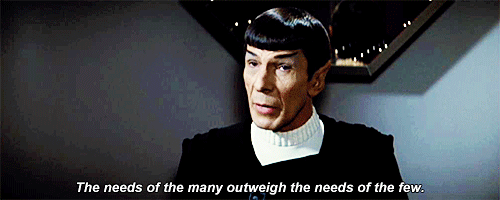
3) Remember this question:
Kirk [when he has to either save Spock’s life or follow the prime directive]: “If Spock were here and I were there, what would he do?”
Bones: “He’d let you die.”
4) London.
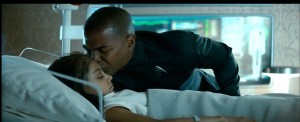
The opening scene with Noel Clarke in London - with his obviously sick daughter, elevated by Michael Giacchino’s subtle and somewhat haunting score - does well to set up the titular darkness the film features. It is somber, slower paced, and much more clawing than what we’ve seen before.
5) Sassy Spock returns!
Captain Pike: “You givin’ me attitude, Spock?”
Spock: “I am expressing multiple attitudes simultaneously, to which are you referring?”
6) Kirk’s key conflict throughout this film is how he deals with mortality. Outside of the death of his father, it is not something he is familiar with. And even that was something which occurred literally the day he was born, meaning he has no memory of it. Yet it still guides his actions. Everything he does - letting the indigenous species from the beginning see the Enterprise to save Spock, attempting to save the species in the first place - is striving to prevent what happened to his father. Kirk plays god not out of ego but because he doesn’t wish anyone to feel the emptiness he knows from that kind of conflict. But he has to learn to let it happen. He has to learn to deal with it, otherwise he’ll go on a bad path. Look at what he almost did when Captain Pike died. He almost let himself get played and go against the core beliefs of Starfleet just to make sure no one else got hurt. But death is a part of life. And he will come face to face with death in a way in a similar-yet-unique way as he did in Wrath of Khan.
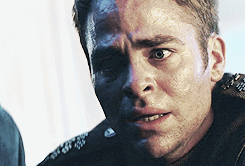
7) The whole “Kirk loses his command, has to go back to Starfleet academy, only to become a first officer and immediately get his command back” thing feels sort of frivolous. I feel it would have been much more effective to have him just be on probation or something, because this sort of undermines the lesson he was meant to learn. There’s not much of a consequence to it.
8) The bar scene between Kirk and Pike (calling back to how they met in the first film) is something I have mixed feelings about.
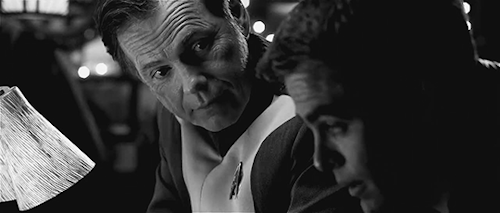
Kirk: “How did you find me?”
Pike: “I know you better than you think.”
Kirk [in reference to the bar fight from the first film]: “Yeah, that was a good fight.”
Pike: “A good fight? I think that’s your problem right there.”
For the most part I think it is a nice piece of the film. It gives us one last good look at their relationship, Pike’s mentorship, and the respect Kirk has for Pike before Pike’s death in a little bit. However - for me - it doesn’t feel like it matches up with when Pike was railing on Kirk earlier in the film. At all. There is this dissonance there I just cannot remedy.
9) The key conflict between Kirk and Spock in this film is interesting. We’ve moved past the place of sheer conflict they started out in the 2009 reboot to a place of respect but there’s still this dissonance between them. They’re not the strong pair that we are used to yet. The best friends. That’s what they become in this film, but they’re not there yet.
Kirk: “Do you understand why I went back for you [to save your life]?”
[Spock does not have an answer.]
10) Hey look, Robocop!
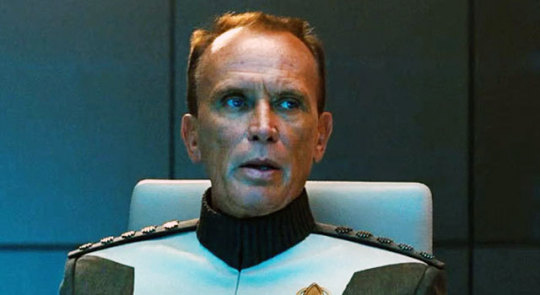

11) At the meeting of the captains, Kirk - even though he’s been disgraced - still says his piece. Yes it took some convincing but he notices something no one else could and stood up for it. And so continues the tradition of Kirk standing up for himself.
12) Spock’s mind meld with Pike plays into his own arc of dealing with death (similar to Kirk’s) very well, but more on that later.
13) Alice Eve as Carol “Wallace”.
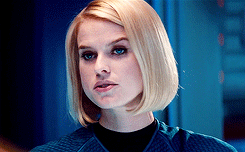
With one noteworthy exception, I truly enjoy Carol’s presence in this film. Alice Eve has always been a favorite of mine and I think she does well in the part. Carol Marcus was an interesting character in Star Trek II: The Wrath of Khan and it’s fun getting to see this younger side of her. She is probably one of the characters with the most underused potential from the original series of Star Trek feature films and I’m glad that - at least for this film - they decide to explore that potential more. More on that one exception later though...
14) It is good to see that Kirk, Bones, and Scotty - while all loyal to Kirk - care more about making sure he is okay than following him blindly. They all act as voices of reason to their captain and their words do set in, it is just a delayed settling.
15) I think Scotty resigning was a nice surprise. I honestly was not expecting it and it lends itself to a few things:
Kirk realizing just how sketchy some of this stuff is.
Kirk being pushed/pushing himself to places he’s never been before.
An organic & unique way of including Scotty later in the film.
16) Love this.
Kirk [about Spock]: “Sometimes I want to rip the bangs off his head. I don’t know, maybe it’s just me.”
Uhura: “It’s not you.”
Kirk: “It’s not? [Beat.] Wait a minute, are you guys fighting?...Oh my god, what is that even like?”
17) Even Chekov knows what a red shirt in Star Trek means.
Kirk [giving Chekov’s Scotty’s old job]: “Go put on a red shirt.”
Chekov [nervously]: “Aye sir...”
18) So one thing that sort of confused me was the fact that Carol is British in this film while in Wrath of Khan she was American. My theory is that the results of the Kelvin made Admiral Marcus (her father) a much more paranoid man, which we know lead to his wife leaving him. I feel like his wife is British and since Carol takes on her mom’s maiden name I have a feeling she grew up more with her than in the original timeline. Hence her British accent. But that’s besides the point...
19) I like that Uhura knows and uses Klingon in this film. In Star Trek VI: The Undiscovered Country, Nichelle Nichols objected to a scene where Uhura had to hurriedly learn Klingon since she felt her character should already know it. In this film, she does! Yay! Progress!
20) According to IMDb:
When calling down to the shuttle bay, Sulu commands the crew to prepare the transport captured during the "Mudd incident last month", a reference to the same character who appeared in Star Trek: Mudd's Women (1966) and Star Trek: I, Mudd (1967) as a rogue trader. He also appeared in the comic prequel "Star Trek: Countdown to Darkness".
Last I heard, Rainn Wilson (of “The Office”) would be playing Harcourt Mudd in the upcoming Star Trek TV show “Star Trek: Discovery”. Moving on...
21) I feel like I’d be Kirk in this scenario.
Kirk [as Uhura and Spock start arguing on a dangerous mission to the Klingon home world]: “Are you - are you really going to do this now?”
22) This is so important to Spock’s arc throughout the film:
Uhura: “At that volcano, you didn't give a thought to us. What it would do to me if you died, Spock. You didn't feel anything. You didn't care...”
Spock: “Your suggestion that I do not care about dying is incorrect. A sentient being's optimal chance at maximizing their utility is a long and prosperous life.”
Spock [later]: “You misunderstand. It is true I chose not to feel anything upon realizing my own life was ending. As Admiral Pike was dying, I joined with his consciousness and experienced what he felt at the moment of his passing. Anger. Confusion. Loneliness. Fear. I had experiences those feelings before, multiplied exponentially on the day my planet was destroyed. Such a feeling is something I choose never to experience again. Nyota, you mistake my choice not to feel as a reflection of my not caring. Well, I assure you, the truth is precisely the opposite.”
That’s it. Right there. I don’t think there’s any more analysis needed. Spock is dealing with death in a similar way Kirk is, except he is dealing with much more relevant and painful memories he is trying to avoid. Kirk has to learn how to deal with those kinds of experiences as opposed to death as a concept.
23) Remember how I said I love that Uhura can speak Klingon now?
Uhura [convincing Kirk to avoid a fight with Klingons]: “You brought me here because I speak Klingon. Then let me speak Klingon.”
I love that she takes such an active role on Kronos of trying to avoid conflict. I love that she puts herself out there for her crew and her team. I just love it all.
24) Here we have Kirk just beating the shit out of “John Harrison” and “Harrison” not doing anything about it because it doesn’t really effect him. Or the plot. I get that Kirk is dealing with how “Harrison” killed Pike, but can’t we just have him hit him once, see it does nothing, and move on?

Also I will talk about Benedict Cumberbatch as “John Harrison”, just not yet.
25) I love Carol Marcus in this film. I think she’s smart, competent, is able to hold her own with Kirk well, and just works really well. However, I hate - hate hate hate - this moment:

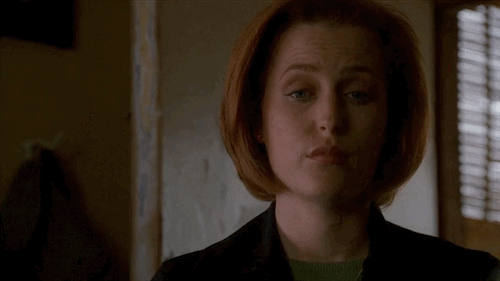
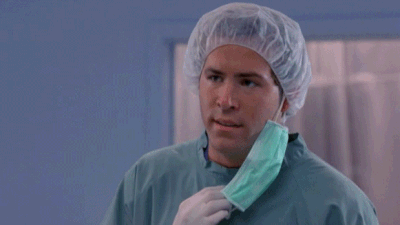
So according to IMDb:
Writer Damon Lindelof apologized on Twitter for the seemingly gratuitous and much criticized scene where Alice Eve strips down to her underwear. J.J. Abrams would counter the criticism later when he appeared on Conan O'Brien's talk show and premiered a deleted scene featuring Benedict Cumberbatch showering. For her part, Eve staunchly defended the scene, and stated that she was very proud to show her her body after working out intensely for the shot. She has maintained that doing the scene was not forced upon her, and that in no way she felt exploited by this.
I like that Eve herself was comfortable with it, that makes me a bit more comfortable with it. However, gratuitous is totally the right word. It literally serves no purpose other than to objectify Marcus when she is so much more than her body. It’s eye candy for Kirk in a film written by guys, directed by a guy, and produced by a guy. And at the end of the day the filmmakers DID cut the scene with Khan, they did not cut this scene. I just...do not like this moment. At all. It feels pointless and makes me sad every time I see it. Again, I like that Eve was comfortable with it. But from a storytelling standpoint it just does not need to exist. At all.
26) I do enjoy the scene immediately following Carol’s strip down, which is where she and Bones take a torpedo to a nearby safe space to try and open it up only to risk blowing it up. It’s a simple, short, yet tense scene which I think is an elegant piece of conflict. It also plays into something which was a regular occurrence in the first film: the idea of if something can go wrong it should go wrong.
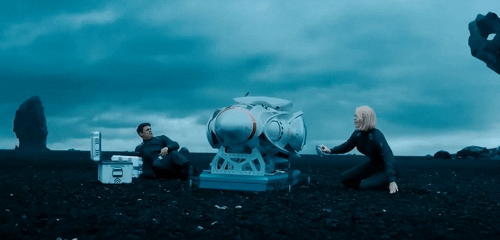
27) Alright, Benedict Cumberbatch as John Harrison.

(GIF source unknown [if this is your GIF please let me know].)
Cumberbatch as Khan is a very mixed bag for me. Like I have a lot of different feelings about it. I like that he is able to play the intellect/physical prowess of the character well, but obviously no one will ever be able to touch Montalban’s performance so there’s not really a point in trying. Since this is an earlier version of Khan, he’s a lot less wrathful than what we’re used to. He’s also less poetic and greener (as is the rest of the crew, in relation to the later of those two). But Cumberbatch is also able to give Khan a brief vulnerability we are not exposed to in Wrath of Khan, specifically in his care for his crew. So in terms of the performance alone, I think Cumberbatch does a nice job. He is a terrific actor so I’m not surprised. But...
I don’t think they should have gone with a white actor, if I’m being honest.
For one thing, Ricardo Montalban is Mexican. And based on what I’ve read about the character’s episode in the original series (I’ve never seen it myself, so I might not be totally right here) he was a ruler of Asia and the Middle East before being deposed and cryogenically frozen (I read on Wikipedia that he’s Sikh, but it still is Wikipedia so there’s a chance that’s not 100% accurate). None of this really screams, “white british guy,” to me. This is a criticism of the casting, not Cumberbatch or his performance.
In an interview with Trekmovie.com, cowriter Bob Orci said:
"Basically, as we went through the casting process and we began honing in on the themes of the movie, it became uncomfortable for me to support demonizing anyone of color, particularly any one of Middle Eastern descent or anyone evoking that. One of the points of the movie is that we must be careful about the villain within US, not some other race"
I do understand the issue there, but Khan is not meant to be representative of all Middle Eastern people or a certain ethnicity. He is a visual representation of himself but he is an individual. It’s not like you are writing him to be the big bad Middle Eastern bad guy. You’re writing Khan, and in the past Khan has been non-White.
Again, this is not a criticism of Cumberbatch himself but of the casting decision. I think Cumberbatch does a fine job in the film, I just think a non-white actor should have been cast. Now that I’m done talking about that...
28) This is Kirk at his most frightened.

He see no way out right now. Admiral Marcus is going to blow his ship out of the sky with his crew, so he pleads with Marcus to just take him and spare his crew. He knows what it feels like to lose a loved one in a situation like this, he knows the hole it leaves in your heart even if it isn’t one he can’t define in the same way as Spock. He wants to spare them so they can go home to their families. Just like he wished his father was spared. And when he can’t do that...
Kirk [to his crew]: “I’m sorry.”
I think Kirk’s emotional conflict in this film is one of its standout elements (possibly its strongest), and whatever other issues this film may have I’m glad it does that well.
29) Fans of voiceover actors will recognize Nolan North as a member of Admiral Marcus’ crew.
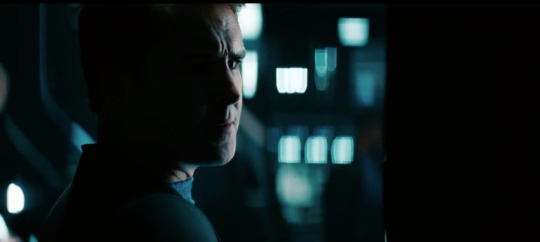
North is most famous for his role as Nathan Drake in the Uncharted series of video games, but also has voiced Deadpool on a number of occasions and even the Penguin in the Batman: Arkham video game series. He’s one of the most prolific and talented voice over actors there is and I believe JJ Abrams included him because he’s a fan of his work.
30) Similarly, Bill Hader voices the computer on Admiral Marcus’ ship and would collaborate with JJ Abrams again on Star Wars: Episode VII - The Force Awakens as a voice consultant for BB-8 with Ben Schwartz.
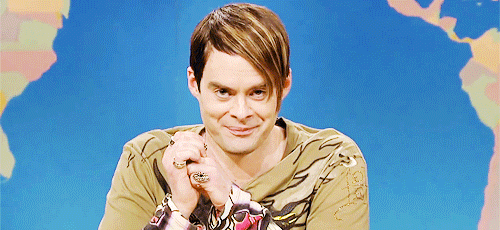
31) I think it’s nice that the tribble (a fan favorite from the original series) is included, but it’s sort of just awkwardly placed while Kirk is talking with Khan just so it can establish a way to resurrect Kirk later in the film.

32) The dive Kirk and CumberKhan make from the Enterprise to Marcus’ ship is a great set piece in the film. Supported by strong visual and great action, it has the potential to be considered iconic Trek a few years down the road.

33) It makes so much sense that Zachary Quinto Spock would call Spock Prime to ask about Khan.

(GIF originally posted by @tomfooleryprime)
Spock Prime: “Khan Noonien Singh is the most dangerous adversary the Enterprise has ever faced...”
Spock: “Did you defeat him?”

Spock Prime: “At great cost, yes.”
34) I like that Kirk is not stupid enough to actually trust Khan.
Scotty [after Kirk tells him to stun Khan when he’s given the signal]: “I thought he was helping us.”
Kirk: “I’m pretty sure we’re helping him.”
35) Wow, the ego on this guy.
Admiral Marcus: “If I’m not in charge our entire way of life is decimated!”
That does not justify the horrific crimes, attempted murder, or extortion you’ve committed. This guy pisses me off way more in 2017 than he did in 2013.
36) Khan crushing Marcus’ head is very strong for me. It feels like it’s straight out of a horror film and really shows just how dark this character is willing to get in the fulfillment of his wrath (see what I did there?).
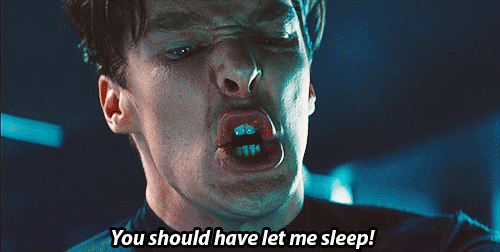
37) The preceding mental chess game between Spock and Khan is very nice, though. It shows just how smart each is, how they’re intellectually matched, and see to succeed Spock must use Khan’s ego (a flaw he has always had) to his advantage. Khan underestimates Spock and just how crafty he can get, to his own disadvantage.
38) Remember note #3? Where Kirk was wondering what Spock would have done if the roles were reversed? Well Trek fans know what Spock DID do when the roles were reversed in the past (alternate timeline? I don’t know). We know Spock very willingly sacrificed himself to save the crew, and so does Jim.
Spock [about the trick he pulled on Khan]: “It’s what you would’ve done.”
Kirk: “And this...this is what you would have done.”
Kirk admits that he’s afraid and that has been his conflict all along. He’s afraid of death, or mortality. Not just for him, but for his crew as well. For his loved ones. But his need to keep them safe outweighs his fear for himself. And this is how Kirk learns to face mortality, by sacrificing himself (as opposed to dealing with Spock’s death in Wrath of Khan). As I said before, a similar-yet-unique way of facing that conflict.
39) Of course this had to be somewhere in the film.
youtube
40) When the Enterprise crashes into the San Francisco bay it destroys Alcatraz. JJ Abrams had a 2011 TV series on Fox named/surrounding Alcatraz that was cancelled in its first season. Hmmm....
41) I like the final chase between Spock and Khan through San Francisco but I always feel its sort of extra. Fun to watch but maybe a little long. The real climax was Spock/Khan’s mental chess game and then Kirk sacrificing himself, this just does not carry the same amount of conflict with it.
42) So Khaan’s blood can...cure death?
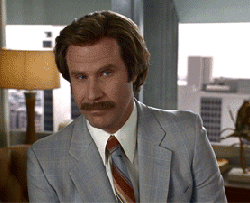
Whatever you can do to keep James T. Kirk alive, I guess.
43)
Kirk: “Dr. Marcus, I’m glad you could be a part of the family.”
Okay, I actually googled why Carol Marcus was left out of Star Trek Beyond and the reason I found I actually REALLY like. This is a quote from Simon Pegg, who cowrote Beyond in a somewhat rushed amount of time.
“With this it felt like we would under-serve her if we included her, she might end up feeling like she hadn’t been given the amount of screen-time she deserves, so rather than bring her in and just have her be a supporting role, like, have her not be in this one, and when the time comes [bring her back], the worst thing to do would be to have her in the film and have that character be killed, and that felt like a cynical thing to do. We thought rather than have Carol Marcus not be used to a reasonable capacity, let’s just not include her, have her be alive, in canon, and ready to come back at any time.”
I’m actually REALLY glad they went that route, because more often than not characters are included out of obligation and killed off because they can’t think of anything better to do with them.
While I do enjoy Star Trek Into Darkness, it is a mixed bag for me. I think the acting is still topnotch and the conflicts each character deals with (ESPECIALLY Kirk and Spock) make for incredible storytelling. Sometime it can feel a bit extra and convoluted however, I’m disappointed in the whitewashing of Khan (even if I do think Cumberbatch did a nice job), and I find the underwear shot of Carol gratuitous. Overall I think it’s a good film just not a great one, and occasionally a problematic one. I do enjoy it. It’s not like I feel like I waste 2 hours of my life whenever I put it in, and this is about the third time I’ve seen it. I just am very aware of its flaws. I hope some of that makes sense. If you want to watch it, watch it. If you are more of a fan of it than I am, fantastic! It’s still a good Trek film (there are much worse Trek films out there), but if it comes down to watching this or any of the rebooted Star Trek films I’d go with any of the other two. Or even better, Wrath of Khan. Maybe I should stop talking now.
#Star Trek#Star Trek Into Darkness#Chris Pine#Zachary Quinto#Zoe Saldana#Benedict Cumberbatch#Alice Eve#Simon Pegg#Bruce Greenwood#Peter Weller#Epic Movie (Re)Watch#Leonard Nimoy#Bill Hader#Nolan North#Noel Clarke#Karl Urban#Movie#Film#GIF
84 notes
·
View notes